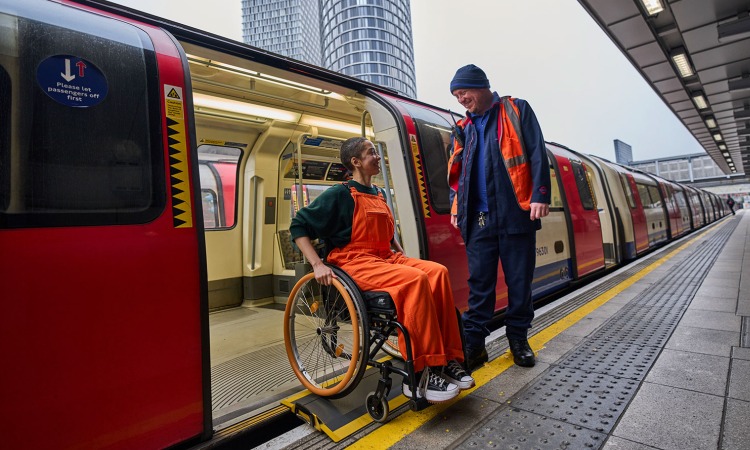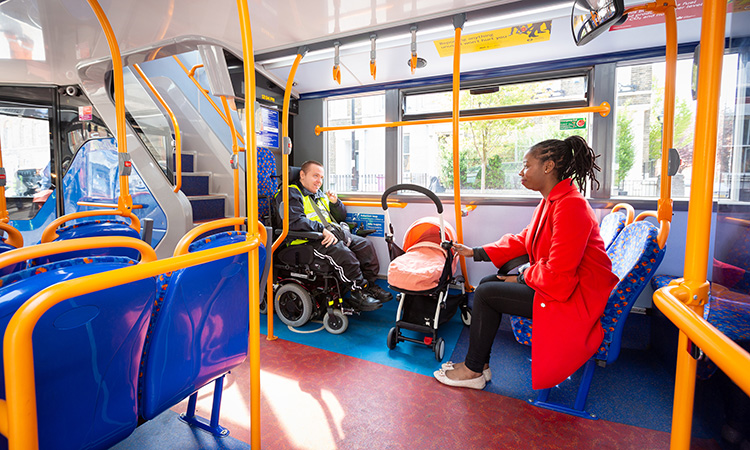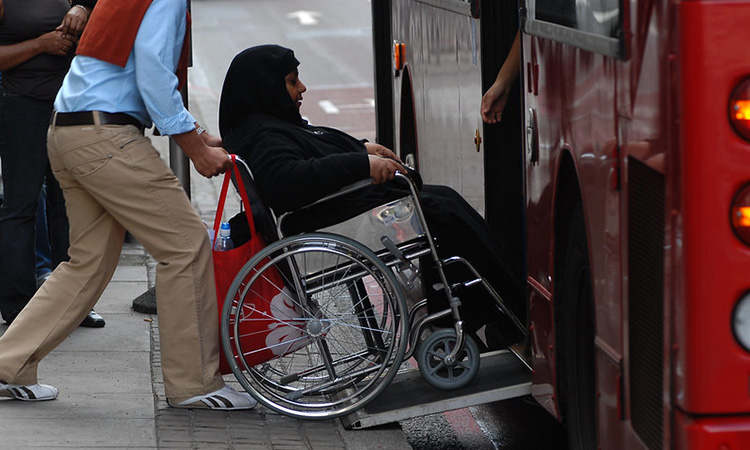Empowering inclusive journeys: TfL’s vision for assisted transport in London
- Like
- Digg
- Del
- Tumblr
- VKontakte
- Buffer
- Love This
- Odnoklassniki
- Meneame
- Blogger
- Amazon
- Yahoo Mail
- Gmail
- AOL
- Newsvine
- HackerNews
- Evernote
- MySpace
- Mail.ru
- Viadeo
- Line
- Comments
- Yummly
- SMS
- Viber
- Telegram
- Subscribe
- Skype
- Facebook Messenger
- Kakao
- LiveJournal
- Yammer
- Edgar
- Fintel
- Mix
- Instapaper
- Copy Link
Posted: 1 February 2024 | Rupali Sharma-Patel - Transport for London | No comments yet
During Transport Innovation Summit 2023, Intelligent Transport’s Halimah Haque sat down with Rupali Sharma-Patel, Head of Assisted Transport; On-Demand Transport at Transport for London, to discuss how TfL’s assisted transport services are evolving to better support urban mobility for Londoners.


Credit: Transport for London
Can you provide an overview of Transport for London’s Assisted Transport Strategy and how it addresses some of the urban mobility challenges faced by Londoners with disabilities or vulnerabilities?
Transport for London (TfL) provides assisted transport services in London, in line with the Mayor’s Transport Strategy and TfL’s goals and objectives. We provide safe and reliable transport services for older and disabled Londoners. Essentially, the key component of our service is to provide an end-to-end customer user experience, which means that, when a new member joins our service or becomes eligible for the service, they get the support that they need to make their journeys. We provide transportation services from their doorstep to the locations that they would like to travel, enabling our customers to maintain their independence.
We are empowering and enabling Londoners to make the most of the capital”
We also wish to increase awareness of the TfL assisted transport offering, both within the organisation and externally. We want our customers to be aware of the transport choices that are available to them and how they can book their journeys.
TfL is always looking for ways to further optimise capacity to ensure that we are making the best use of our funding and are providing the best possible service for Londoners. We are working continuously to improve accessibility across our network to support older people or those with disabilities to use public transport. In addition to TfL’s Assisted Transport Service, customers can also use public transport, which I believe is getting more accessible every day. If people feel less confident about using public transport, we have a Travel Mentoring service in place, which provides advice and support for people when they are using public transport. This is achieved by talking to them and accompanying them on their journeys. In this way, we are empowering and enabling Londoners to make the most of the capital.
Can you tell us a bit more about the key goals and objectives of the Travel Mentoring team that you’ve just mentioned, and the role that it plays in empowering disabled and vulnerable Londoners to become independent travellers?
The Travel Mentoring programme… is one of many ways that we encourage and support people to use our services, and it’s also a way to help people feel more independent”
The Travel Mentoring programme is a free service that we provide to customers who want to become more confident when using TfL’s services. It supports people in and around London to become independent travellers by providing them with tailored support based on their individual needs. For example, when a customer may have a request such as, “I need more support to make a journey from my house”, or they’ve recently become disabled and so don’t yet understand what options are available to them, they can contact the mentoring team who will talk them through the options and even accompany them in person on a journey. Travel mentors can complete the journey with the vulnerable individual to enhance their confidence. This is one of many ways that we encourage and support people to use our services, and it’s also a way to help people feel more independent.


Credit: Transport for London
TfL also organises bus days for children with special needs who are transitioning from primary school to secondary school. Bus days give children the opportunity to experience what it’s like to travel on public transport. Through this initiative, children are able to understand what it’s like to travel independently and what they need to look out for. Above all, it enables them to experience what it feels like to be confident travellers.
What role do technological advancements play in enhancing accessibility and choice for TfL customers?
Although we are introducing a new way to access our services, we appreciate that customers need and value human contact, therefore we are not taking away any of our existing methods”
One of the key pillars of our strategy is to provide our customers with multiple ways to access our services. Traditionally, people could book a journey by calling, emailing or writing to our customer contact centre. We have now introduced a new app to help customers to book journeys and make any amendments or cancellations to their bookings. This is just another way that we aim to increase the accessibility of our services for TfL customers.
Although we are introducing a new way to access our services, we appreciate that customers need and value human contact; therefore, we are not taking away any of our existing methods. This is just another way that we’re incorporating technology and making sure that there’s more choice available for our customers.
We want to become a one-stop service for all assisted transport services. The new system will enable us to achieve this ambition.
TfL is also known for its commitment to sustainability. So, how does the Assisted Transport Strategy integrate sustainable practices to minimise the environmental impact, but also while ensuring accessibility for everyone?
TfL is aligned to the Mayor’s Transport Strategy, corporate environment plan and the United Nations’ sustainable development goals (SDGs). Therefore, our service aligns itself to TfL’s environmental objectives and we are always looking for ways to become more sustainable and efficient to deliver on our net zero commitments. This includes looking at our business as a whole, inclusive of our fleet and operations.


Credit: Transport for London
Looking ahead, how does TfL plan to leverage emerging technologies and innovations to further enhance the accessibility and efficiency of assisted transport services in London?
One area we are currently exploring is looking at ways to simplify our application process”
We are very proud to provide assisted transport service solutions that serve the needs of Londoners. Our strategy sets out our vision to become a world class service, while our roadmap identifies various actions that we would like to achieve. One area that we are currently exploring is looking at ways to simplify our application process.
We use our data and work with various external stakeholders to understand current and future customer needs. We also work with internal teams to understand emerging technologies which we can then incorporate to make our services more accessible. The new system we have incorporated exemplifies this process. So, we will continue to work on these objectives to make sure that our service becomes more accessible, more reliable and assists more people.
In an era of changing demographics and evolving mobility needs, how does TfL envision adapting and expanding its assisted transport services to meet the evolving requirements of London’s diverse population in the coming years?
We work closely with TfL’s Operational, Accessibility and Strategy teams to understand the evolving needs of our customers. This is evident in how we adapted and continued to provide a reliable service during the COVID-19 pandemic.
Essentially, quite a lot of what we are working towards is to understand our customer needs by analysing data and patterns. An example of this is the data around customers origin and destination. We can use this information to plan or route our journeys and improve the service for our customers.


Related topics
Mobility Services, Passenger Accessibility, Passenger Experience, Public Transport
Related modes
Bus & Coach, Rail
Related cities
London
Related countries
United Kingdom
Related organisations
Transport for London (TfL), UK Government
Related people
Rupali Sharma-Patel, Sadiq Khan







